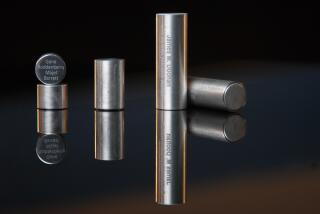Team of English Astronauts Looking Ahead to First Flight
- Share via
The British are coming, finally. They may be a few decades behind the Americans, but that doesn’t matter a bit, really, according to a team of properly enthusiastic English astronauts who were in Huntington Beach on Friday to inspect McDonnell Douglas’ satellite launch equipment.
The hardware, known as a payload assist module, will be used next June when one of the astronauts, Nigel Wood, is scheduled to accompany a British military communications satellite on a space shuttle flight. Wood would be the first Briton in space.
During the past 15 years, while the United States was putting humans into space, Britain focused on building satellites. The formation of its four-man astronaut team was “a bit of an accident, really” said astronaut team leader Peter Langhurst, 42, of Somerset, a commander in the Royal Navy. It began when NASA invited the British Ministry of Defence to send payload specialists (experts on the particular satellite cargoes) on a shuttle flight, he said. The selection process began a year ago.
“This is a fantastic opportunity,” said Langhurst, who is scheduled to be the second Briton to fly in the shuttle on a later mission. “No other way were we going into space.”
The British Ministry of Defence decided to form a team with representatives from each branch of the military and one civilian. In addition to Langhurst and Wood, 35, a Royal Air Force squadron leader from Fleet, there are Wood’s backup, Richard Farrimond, 37, from Bristol, a lieutenant colonel in the Royal Army, and Langhurst’s backup, Chris Holmes, 34, from Kingston Upon Thames, who is a Ministry of Defence civilian physicist.
Wood is a pilot, and the others are specialists in engineering and communications, Langhurst said.
The team has been training since spring to prepare for the one-week flight next year. Every two months they travel to the Johnson Space Center in Houston, the U.S. Department of Defense Satellite Control Facility in Sunnyvale, Calif., or the McDonnell Douglas facility. “This is our second time in L.A.,” Langhurst said. Seventeen weeks before the launch, they will begin living in Houston full time for concentrated training.
Wood’s flight will also mark the first British satellite launched from a shuttle. In addition, he will be conducting secondary experiments to test the effects of space on radiation, glue and fluids, as well as to see how weightlessness affects muscles and judgment.
The announcement in April that Wood would be the first Briton in space set off a barrage of publicity in England. Why was he chosen by the secretary of state for defense to be the first? “I don’t know,” Wood said with unwavering eye contact. “He didn’t tell us why.”
The news has led some to question Britain’s past and future role in space, Langhurst said. All hope the publicity back home will lead to a national space program that involves manned space flight. “We don’t want to lose what we’ve gained,” added Holmes.
“The next 10 or 15 years will open up a whole range of opportunities,” Wood said. “We’d like to see a proper, constructive approach to use these opportunities, rather than miss the boat.
“Perhaps,” he added, “our purpose is to sell the idea, wave the flag a bit.”
Also part of their job, he said, is to “get children interested in space. We want to tell them engineering is not dull.”
Langhurst said he grew up in an age when children wanted to be train engineers. “Now, all the children we talk to want to be spacemen. That’s the kind of optimism we want,” he said.
Langhurst said the astronauts’ families--spouses, children and parents--are “pleased as punch.” He and Holmes are bachelors; Wood and Farrimond are married.
Nonetheless, he said, “We’re not heroes. It’s just a job to be done . . . . Actually, the bulk of the training is painstaking, engineering stuff and fairly unglamorous. “
They don’t spend much time thinking about the experience of space flight, said Wood, although he acknowledged that “the launch has to be one of the most spectacular rides anyone could ever be involved with.”
“We feel awfully lucky and honored,” Langhurst said.
Although he called Britain’s contribution to space exploration “small beer compared to the United States’ (contribution),” Langhurst said his country is now working on a revolutionary space shuttle, unmanned as yet, that takes off and lands by itself. It is called HOTOL, for Horizontal Take Off and Landing. Additionally, British Aerospace, which built the satellite, is developing a free-flying platform for a space station.
As “payload specialists,” the British astronauts join a growing international group of experts asked by NASA to fly on shuttle missions. By including specialists from such countries as Mexico, Indonesia and France, the “good old U.S. of A. is spreading a cloak of international good will,” Langhurst said.
More to Read
Sign up for Essential California
The most important California stories and recommendations in your inbox every morning.
You may occasionally receive promotional content from the Los Angeles Times.













